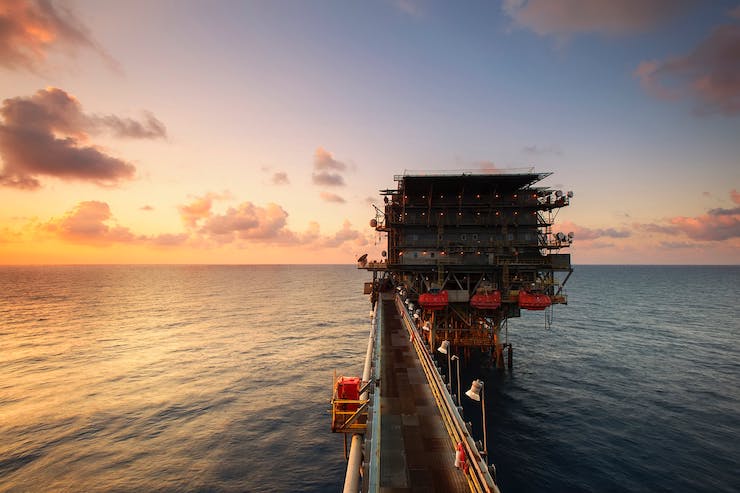Israel Protecting Its Oil Rigs from Drone Attacks

In 2010, about 80 miles off the coast of Haifa, a discovery that could greatly impact Israel’s energy needs was made. The Leviathan gas field rests 4,900 feet bellow the water surface in the Mediterranean Sea with enough gas to support Israel for at least 40 years. This could give Israel a chance to have some energy independence from it’s neighboring suppliers like Egypt and Turkey. Construction on the massive Leviathan platform began in early 2019. By December, 2019 everything needed, including a helipad, living quarters, and equipment for drilling, production, and processing was in place and ready to go. Having such a valuable resource brings a lot of economic security to the country, along with some fears of further terrorist actions.
It is no secret that Israel is a country that is surrounded by enemies looking for any opportunity to strike. In September of 2019, Houthis used drones to attack the Abqauq and Khurais Saudi Arabian state owned oil fields. The attackers launched 10 drones from within the Yemen border, south of the oil facilities. Shortly after a second wave of drones attacked from the the north and the east, and though they deny it, it is believed that Iran may be responsible for part of the attack. The drones caused massive amounts of damage puncturing storage tanks and disabling processing trains. Once the fires started by the drones were put out the facilities had to be shut down for repairs. This resulted in Saudi Arabia’s oil production for the year being cut down in half, 5% of which contributes to global oil production.
The Leviathan gas field is co-owned and operated by the Houston based oil company Noble Energy and the Israeli Delek Group. There is some dispute about Leviatine basin, where the gas field sits, as to whether it is in Israeli or Lebanese waters. Lebanon argues that the gas field should belong to them and as Nabih Berri, Lebanon’s Parliament Speaker said, Israel is “ignoring the fact that according to the maps the deposit extends into Lebanese waters.” To which Israel’s Minister of National Infrastructures Uzi Landau replied, “We will not hesitate to use our force and strength to protect not only the rule of law but the international maritime law,” further reinstating Israel’s position of claim of the Leviathan gas field.
With so much at risk, tensions high, and a fear of a repeat of the Abqauq and Khurais drone attacks, Israel’s navy has begun running war scenarios to protect the Leviathan gas field against possible Hezbollah attack. Lt. Col. Guy Barak, commander of the 34th Anti-Submarine Squadron, said,”We assume [Hezbollah] will try to attack on the maritime front. They see it as a very important arena. With an enemy like Hezbollah, a surprise can come on the tenth day of a war or within the first hour. So we have to know how to go from zero to 60 fast.” Though he would not say what types of weaponry they believe the Lebanese Hezbollah possesses, he did say that “We have to think that whatever Iran has, Hezbollah, and Hamas, can also have.” This would surely include suicide drones.
The navy ran a week long simulation of what would happen if an attack were to occur. Many of the scenarios were conducted through virtual training means, with some done through practical exercises. One such exercise was to train in the event of a suicide drone, a drone packed with explosives sent to crash into a target. As this is an inexpensive, easy to get weapon, it has become a favorite among groups that target Israel. The navy hired a civilian company to help carry out this particular war game scenario. The company flew a Styrofoam drone around and near the ships participating. They used a Styrofoam as opposed to a hard bodied drone strictly because it was for testing purposes, the material of the drone made no difference in the test results. They also only used a single drone in the test when it is possible that an attack cold include a lone drone or swarm of them. More tests will have to be carried out to practice for further situations, but the results of this one proved that the ship’s gunner was able to take out the drone before it could inflict any damage.
These war game do not come without reason. Lebanon has already made their stance on Leviathan well known. There have been verbal threats made by the Hezbollah alluding to a maritime attack. The group has even gone as far as to release images of the Leviathan platform as a threat. In 2006 Hezbollah attacked the Israeli ship INS Hanit killing 4 soldiers. The ship was not destroyed, but Hezbollah celebrated the moment as a great victory. Israel’s navy vowed to never allow this to happen again, so they take every precaution. An attack on the Leviathan gas field would serve as a huge victory for Hezbollah, one that would be seen around the world. However, Israel’s navy is not prepared to allow this to happen. As L. Col. Barak said, “Hezbollah knows that if an all-out war breaks out, the IDF will display force like never before, and that will include a ‘punch’ from the sea from the 3rd Flotilla.”
|